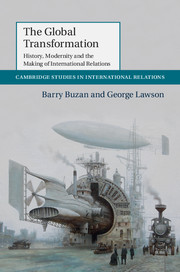Book contents
2 - IR and the Nineteenth Century
Published online by Cambridge University Press: 05 February 2015
Summary
Introduction
This chapter addresses the question of why IR pays so little attention to the global transformation. First, we look at a range of IR authors whose understandings of the importance of the nineteenth century reflect ours, but whose views on this point are marginal within the discipline. Second, we explore three approaches to the nineteenth century in IR: as an absence; as a source of data; and as a fragment of a wider research programme. Finally, we examine why IR has largely forgotten the nineteenth century and why this is a problem.
Understanding the Nineteenth Century in IR
It is not the case that no IR scholarship recognizes the significance of the nineteenth century. Interestingly, such recognition stretches across the theoretical spectrum. From a Marxian perspective, Fred Halliday (2009: 19) recognized ‘the radical difference, and rupture, that divides the modern, roughly post-1800 world from that which precedes it’. Halliday also noted in disciplines outside IR ‘the insistence of writers such as Karl Polanyi in economic history, of Ernest Gellner in sociology and of Eric Hobsbawm in history on the great divide that separates the pre-modern and modern worlds’. From a broadly post-structural perspective, Ole Wæver (1997: 7–8) observes that ‘the nineteenth century is strangely absent [from IR] despite the fact that it is actually in the late eighteenth- and nineteenth-century works that one is best able to find its connecting lines, continuous ideas and real inspirations’. From an English School perspective, Little (2014) argues that many of the contributors to Bull and Watson’s (1984a) The Expansion of International Society, including the editors, were fully aware that the nineteenth-century transformation in power and wealth, and the associated transformations in the states and international society of Europe, underpinned a basic change in Europe’s relationship with Africa and Asia. From a Realist perspective, Hans Morgenthau (1978) argued that the period 1789–1919 constituted an important transformation from inter-dynastic to international politics (Little, 2007: 109–18). And, writing from a liberal perspective, John Ikenberry (2009: 71) notes that:
The most important transformation in world politics unfolding over the last two centuries has been what might be called the ‘liberal ascendency’.
- Type
- Chapter
- Information
- The Global TransformationHistory, Modernity and the Making of International Relations, pp. 46 - 64Publisher: Cambridge University PressPrint publication year: 2015

